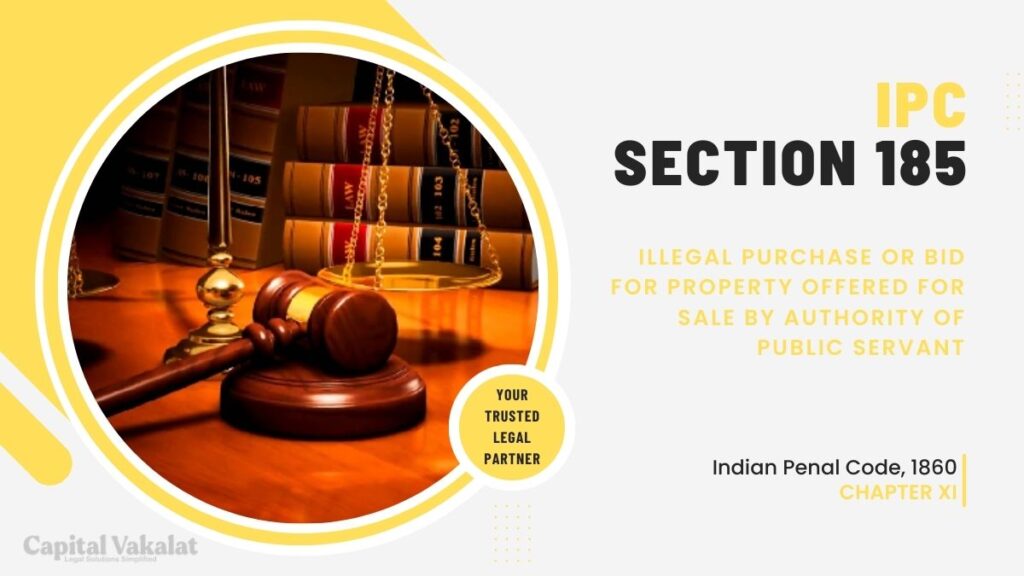In a society governed by laws, public servants play a vital role in maintaining order and ensuring justice. Section 185 of the Indian Penal Code (IPC) deals with illegal purchases or bids for property offered for sale by an authority of a public servant. This legislation is crucial to uphold the integrity of public service and prevent corruption.

In this article, we will delve into the nuances of Section 185 IPC, its implications, and the legal aspects surrounding it.
Introduction to Section 185 IPC
Section 185 IPC is a legal provision that seeks to maintain transparency and honesty within government transactions. It primarily deals with cases where individuals attempt to unlawfully purchase or bid on properties that are offered for sale by a public servant.
What Constitutes an Illegal Purchase or Bid?
An illegal purchase or bid, as defined by Section 185 IPC, occurs when an individual knowingly attempts to acquire a property through deceit, forgery, misrepresentation, or any other unlawful means. Such actions not only undermine the authority of the public servant but also tarnish the reputation of the legal system.
Authority of Public Servant and Their Role
Public servants, who often hold positions of trust and authority, are responsible for executing and supervising the sale of government-owned properties. Their role is pivotal in ensuring that these transactions are carried out in a fair and unbiased manner.
Consequences of Violating Section 185 IPC
Section 185 IPC outlines strict penalties for those found guilty of illegal purchases or bids. The guilty party may face imprisonment, fines, or both, depending on the severity of the offense. The law takes a firm stance to deter individuals from engaging in such activities.
Defenses against Allegations
In some cases, individuals may be wrongly accused of violating Section 185 IPC. Therefore, the law allows for the presentation of a strong defense to prove innocence. Evidence of unintentional actions, lack of knowledge, or other extenuating circumstances can be used to refute allegations.
Recent Case Studies
To better understand the practical implications of Section 185 IPC, it is essential to examine recent case studies. Real-life examples provide insights into the legal proceedings and their outcomes, shedding light on the complexities of such cases.
Understanding the Legal Process
Navigating the legal process when accused of violating Section 185 IPC can be challenging. Legal proceedings, the role of the prosecution and defense, and the burden of proof are all important aspects to consider.
Importance of Legal Counsel
Legal experts play a pivotal role in assisting individuals facing allegations under Section 185 IPC. Hiring an experienced attorney can significantly impact the outcome of a case, ensuring that the accused receive fair and just treatment.
How to Prevent Violations
Prevention is always better than cure. Understanding the law and adhering to ethical practices is the best way to avoid violating Section 185 IPC. It is crucial for individuals to be aware of their actions when dealing with public servant-led property sales.
Conclusion
Section 185 IPC is a cornerstone of maintaining the integrity of public service and government property transactions. By upholding transparency and fairness, it ensures that the trust placed in public servants remains unwavering.
In conclusion, Section 185 IPC serves as a critical legal safeguard to maintain the integrity of public service and property transactions. It is imperative for both citizens and public servants to understand the implications of this law and adhere to its provisions.
Frequently Asked Questions
Can an innocent person be charged under this section?
Yes, innocent individuals can be wrongfully charged. However, a robust defense can help prove their innocence in court.
How can one prove innocence in such cases?
Innocence can be proven through evidence showing lack of intent, ignorance of the law, or other extenuating circumstances.
Are there any exceptions to this law?
Section 185 IPC is applicable in most cases, but exceptions may exist based on specific circumstances, which legal counsel can address.
How does this law impact public servants?
This law emphasizes the responsibility of public servants to ensure transparent property transactions and acts as a deterrent against corruption within the public service.